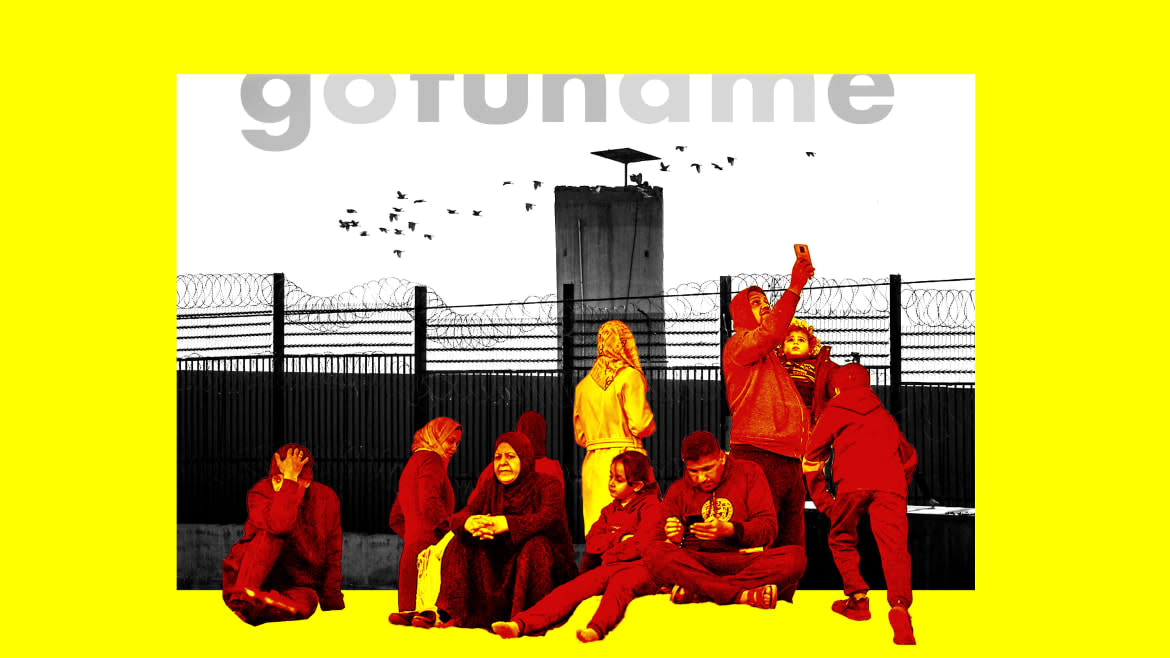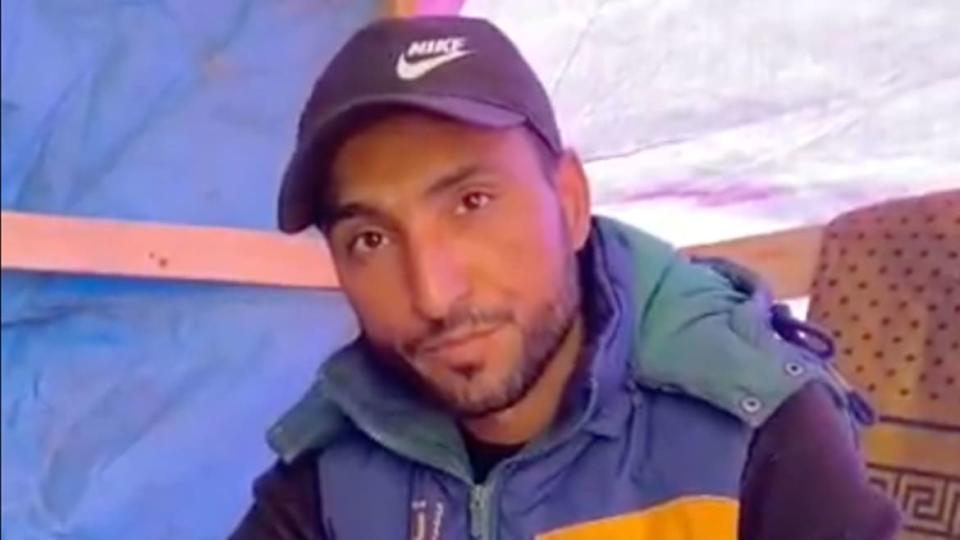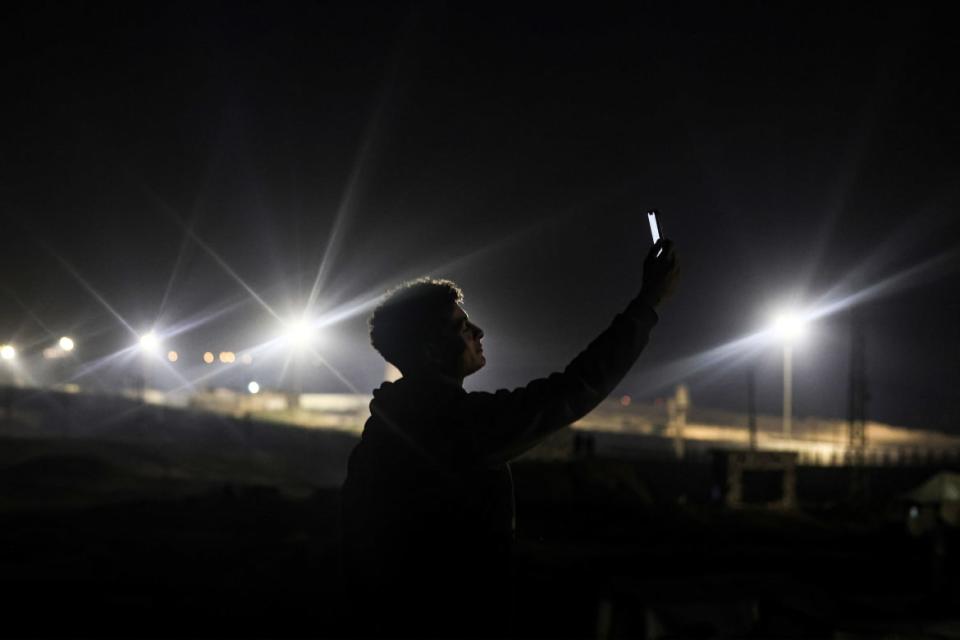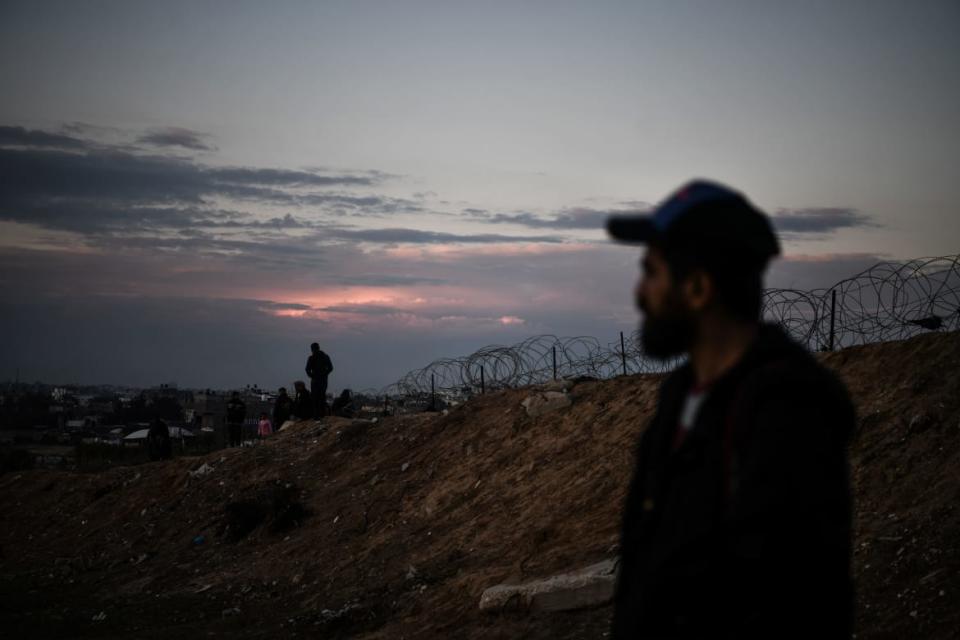Desperate Palestinians Set Up GoFundMes to Pay Huge Bribes to Escape Gaza

Desperate Palestinians are creating GoFundMe accounts to ensure their families in Gaza find a safe way out of the region.
Many are asking for tens of thousands of dollars from strangers, a last resort to get names on the Egyptian border-crossing list that allows 150 people per day to leave Gaza. Getting your name on the list is the only way out of Gaza, and there is no mercy shown for the injured, starving, or those fighting off diseases.
Multiple people The Daily Beast spoke with said it costs up to $6,500 per person for Palestinians to have their names included on the list, and the money must be paid to “brokers” with the Egyptian intelligence service.
Some people are turning over their life’s savings, or tens of thousands of dollars in donations, with no guarantee that the person they give their money to is trustworthy, or a scam artist benefiting from the sacrifices of war.

Abo Yousef
The Price of Freedom
It was always this way; crossing the Egyptian border entailed paying bribes even before Oct. 7. The costs of leaving Gaza ranged from $200 to $600, and many Palestinians paid the price to leave Gaza for various reasons, varying from doctor’s appointments to studying abroad.
Although the costs were hard for many because more than half of the population in Gaza and the occupied West Bank experienced poverty, it was still manageable for some. But in the aftermath of the war, the costs to leave spiked to as much as 10 times greater.
“People who are on the list in Gaza are, unfortunately, only the rich,” said Fatima, a refugee from Gaza whose family raised $20,000 on GoFund Me to get her mother and two sisters out of the enclave. Fatima requested her name be changed out of fear for her relatives still in Gaza.
During the six-day ceasefire, Fatima’s father, a local fixer who had worked with countless international media groups throughout his career, died after complications due to a heart attack. The family had tried to take Fatima’s father to the hospital, but she said they were turned away.
“It’s not urgent,” Fatima recalled the hospital staff saying to her in a phone call, “There’s no space,” they added.
“I started losing hope. I told myself it’s impossible to leave. You just pray to God, pray that this war will someday end,” said Fatima.
“My last wish was: If something happens to me and my daughter. If we are going to die, please, God, let us die all together,” she added.
Adorable Instagram Babies of Gaza Page Is Now a Haunting War Memorial
Fatima and her daughter had been granted visas to Australia, which gave Gazans a lifeline to move to the country. However, visa grantees must find their own way out of the Gaza Strip. Eventually, Fatima, her daughter, and her in-laws managed to get their names on the Egyptian border crossing list without paying but their escape did not include Fatima’s extended family, whom she was forced to leave behind.
“I’m so selfish,” Fatima recalled thinking as she packed her and her daughter’s bags to leave Gaza.
“I could not save my family and started crying. And my mom told me, ‘You need to go. You need to go,’” because leaving was the only way to ensure that Fatima’s daughter could survive the rest of her childhood without being killed in an Israeli attack.
Fatima’s sister, who lives in Germany, created a GoFundMe account to raise the over $20,000 it would take to get the remaining sisters and mother out of Gaza.
A World of Support
Fatima’s sister is not the only one who has turned to GoFundMe to raise money for support. Hundreds of people have taken to the platform recently to plead for donations to help people in Gaza.
“Help my family escape the Genocide in Gaza,” reads one GoFundMe account from a student in Berlin, Germany, who has raised $23,000, which is still $11,869 away from its goal.
“My cousin contracted an epidemic disease that is spreading around, and her condition is getting worse every day. There is no safe place in Gaza anymore; if the bombs don’t reach them, then hunger and diseases will,” it adds.
“Help my family leave Gaza,” writes another from Germany. The account has raised just 12 percent of its requested $38,138.
In the U.S., one GoFundMe account raised $101,681, surpassing its goal by $1,000. Comments underneath it read “Free Palestine.” Another reads, “I donated because I want to see Palestinian people safe, away from the genocide… with the conditions at this time, I feel it’s important to get some people off the land. Palestinian culture will not be erased.”
Although there have been some success stories, like that of Fatima’s family, who raised enough money to pay the Egyptian brokers, inside Gaza, there is no time to wait and no way to pay the fee.

A displaced Palestinian using an eSIM card attempts to get a signal in order to contact his relatives on January 19, 2024, on a hill in Rafah, on the southern Gaza Strip on the border with Egypt, amid continuing battles between Israel and the militant group Hamas.
Trapped in Gaza
In Gaza, over 85 percent of the population is displaced, many of whom are now living in makeshift tents amongst constantly bombed streets.
At a refugee camp in south Gaza, a 36-year-old man named Abo Yousef sits in a tent as he tells The Daily Beast about his experience trapped in a warzone. Yousef holds Egyptian nationality. His mother and father are from Egypt, his brother, and his family, and Yousef’s wife and children all live in the neighboring country. Despite being an Egyptian citizen, he has been unable to cross the border.
“I have tried many times to travel, and they (guards) told me I need to coordinate with the Ministry of the Exterior. I have been told that I have to pay to travel,” explained Yousef.
“Those people (brokers) ask for a huge amount of money. I can’t pay that amount. Those are not formal people and cannot (be) trusted,” he added.
Gaza has been without internet or electricity for weeks at a time, making it nearly impossible for residents to communicate with the outside world. Yousef, 36, said he had not heard about people turning to GoFundMe to raise money to pay broker fees, but each week, he walks to the Rafah border crossing to see if his name has been added to the list.
On Jan. 23, Israel offered Hamas a two-month ceasefire in exchange for the return of all hostages and the bodies of those who have died, as part of a deal made with Egypt and Qatar. On Wednesday, Hamas said it had received a new proposal for a three-part ceasefire. The proposal is seen as the most serious peace initiative since the ceasefire in November. But Israeli Prime Minister Benjamin Netanyahu has vowed not to pull troops out of Gaza until there is a “total victory,” which means eliminating Hamas, returning all hostages, and ensuring that Gaza will no longer “pose a threat” to Israel.
For many people, hope that attacks will die down even for a few days has diminished as the war rages on.
Since Oct. 7, Yousef has lost family members, friends, and neighbors in Israel’s brutal reaction to Hamas’ attack. Last week, a neighbor who had eaten with Yousef for three months was killed in a bombardment at his location. “Three months we ate together, in a minute, we lost our colleague,” said Yousef.
“We are living in the middle of a disaster. Situation is very bad. No shelter, no police, no aid,” he added.

Palestinians who fled Israeli attacks and took refuge in Rafah, try to continue their daily lives under difficult conditions in the area near the border wall between Egypt and the Gaza, in Rafah, Gaza on January 29, 2024.
Nightmares of War
In Egypt, Fatima and her family are planning to move to Australia, but the terror and bloodshed the young mother has witnessed in her homeland since Oct. 7 has not strayed far from her mind. As Fatima watches the news, buys clothes for her daughter, or cooks a warm meal, she feels survivor’s guilt. Knowing that the people who have become human collateral, innocent civilians trapped in the crossfire between Israel and Hamas, have nothing. It has taken a toll on her mental health. In Egypt, Fatima works with a psychologist to process the trauma she has experienced.
Speaking of the long history of war and massacre between Israel and Palestine, Fatima said, “I don’t believe in this world anymore. It’s the world of the white person. Human rights, freedom, it’s just only for the white person. We paid the price of the Holocaust,” she said.
“I hate going to sleep because when I’m awake, I’m here in Egypt. While I’m sleeping, I’m there in Gaza with all scenarios: evacuation, bombing. I wake up screaming. I wake up not understanding where I am.”
Khalel Ibrahim contributed to reporting from Gaza.
Get the Daily Beast's biggest scoops and scandals delivered right to your inbox. Sign up now.
Stay informed and gain unlimited access to the Daily Beast's unmatched reporting. Subscribe now.


